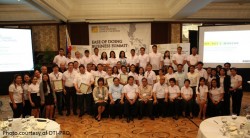- Home
- |
- About Us
- |
- Working Groups
- |
- News
- |
- Rankings
- WEF-Global Competitiveness Report
- Ease of Doing Business Report
- IMD-World Competitiveness Yearbook
- TI-Corruption Perceptions Index
- HF-Economic Freedom Index
- WEF-Global Information Technology Report
- WEF-Travel and Tourism Report
- WIPO-Global Innovation Index
- WB-Logistics Performance Index
- FFP-Fragile States Index
- WEF-Global Enabling Trade Report
- WEF-Global Gender Gap Report
- Gallery
- |
- Downloads
- |
- Contact Us
NCC Pushes for Doing Business Reforms to Improve Philippine Competitiveness

The National Competitiveness Council (NCC) laid out its game plan to boost Philippine competitiveness rankings at its second annual Ease of Doing Business Summit. During the summit, members of the inter-agency Task Force on Ease of Doing Business vowed to simplify business regulations and implement targeted reforms before major stakeholders from government, business, development organizations, diplomatic corps, and media. In attendance were Budget Secretary Florencio Abad, Trade and Industry Undersecretary Nora Terrado, and International Finance Corporation (IFC) Resident Representative Jesse Ang.
The reforms were designed by the NCC, together with the public and private sector Task Force, based on the Doing Business Report of the IFC. The report measures the ease with which a business undertakes certain processes with various government agencies. Last year, the Philippines made headlines by advancing 30 places from No. 138 to No. 108 of 189 economies in the report. The country is eyeing to be in the top third of world rankings by 2016.
For this year, the Task Force has pledged to deliver the following improvements in the ten processes measured in the report:
- A reduction in time to start a business from 15 steps and 35 days to 8 steps and 8 days
- A reduction in time to get a construction permit from 25 steps and 77 days to 14 steps and 65 days
- A reduction in time to get an electricity connection from 5 steps and 42 days to 4 steps and 32 days and a reduction in the security deposit from PhP519,640 to PhP226,250
- A reduction in time to transfer and register property from 8 steps and 39 days to 7 steps and 16 days
- An increase in score on the strength of legal rights to protect borrowers and lenders from 4 to 10 out of 10
- An increase in scores measuring minority shareholder protection against the misconduct of a director from 2 to 7 out of 10 on disclosure, 3 to 9 out of 10 on director liability, and 8 to 10 out of 10 on shareholder suits
- A reduction in tax and contribution payments required from 36 to 13 per year
- A reduction in the 6 documents and 15 days needed to export goods to 4 documents and 9 days
- A reduction in the 7 documents and 14 days needed to import goods to 4 documents and 9 days
- A reduction in time to enforce a commercial contract in court from 37 steps and 842 days to 30 steps and 360 days
- An increase in the recovery rate on insolvency proceedings from 29.9 to 42.4 cents per dollar
In addition to further streamlining, these improvements will be accomplished through the more aggressive promotion of existing government services such as express registration through the Green Lane Unit of the Securities and Exchange Commission (SEC) and electronic payments for the Philippine Health Insurance Corporation (PhilHealth) and Pag-IBIG Home Development Mutual Fund contributions. This will encourage more corporations to take advantage of faster and more convenient processing.
On the local government side, the Task Force has recommended the amendment of Executive Order No. 17-A creating a one-stop shop for the processing of building permits in Quezon City, the local government unit measured by the Doing Business Report, to include warehouses. Practice in Quezon City serves as the prototype for other Local Government Units.
For legal issues, the Task Force will continue to provide documentary support on Philippine laws and regulations and monitor the status of the e-court system. It has also endorsed and approved the Proposed Rules on Hearing and Adjudicating Disputes, which have been referred by the Office of the Chief Justice to the Supreme Court Sub-committee on the Revision of the Rules on Civil Procedure.
NCC Private Sector Co-Chairman Guillermo M. Luz stressed the need to revolutionize the bureaucracy to sustain the momentum for competitiveness, especially as other countries continue to reform. Changes to the report are also expected to toughen up the competition, with the addition of new cities to be included in the report and the expansion of measures to cover not just efficiency but also quality of business regulations. He commended the Task Force for their continuing efforts but challenged them to deliver even more large-scale reforms.


